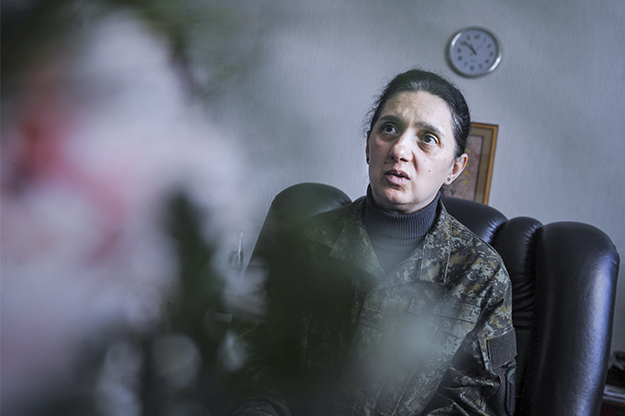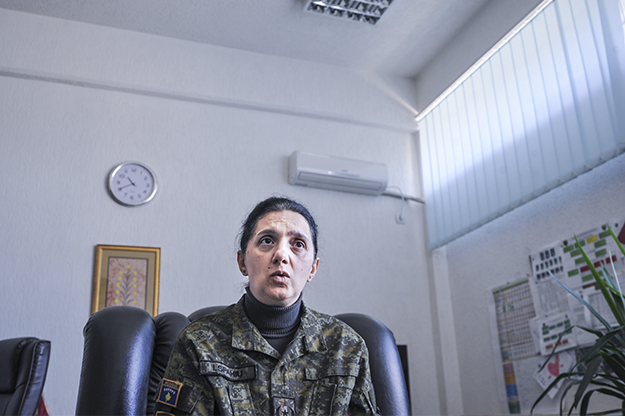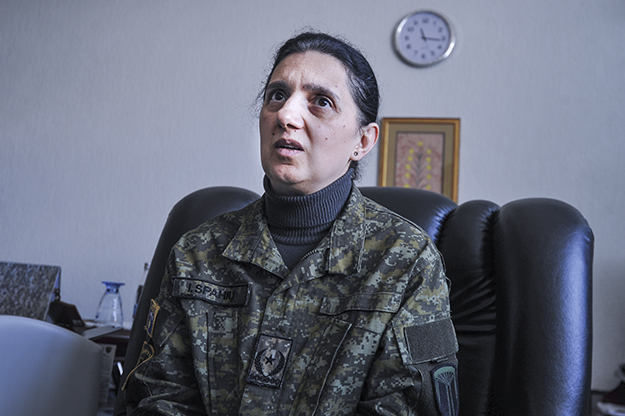The first time she fired a gun, Irfete Spahiu was as a young woman in her twenties, yet to finish her studies in economics and law at the University of Prishtina. She held the revolver in the compound owned by the family of Kosovo Liberation Army (KLA) commander Adem Jashari in Drenica. It was March 1996.
As she went to the makeshift shooting range, she realized that the first bullets she would fire would also signify the end of her past life and the start of a new life, which she would swear never to back down on. The same revolver she had fired for the first time just days before was to be placed in front of her in the Jashari kulla, where she would swear in with the KLA.
“As a member of the Kosovo Liberation Army, I swear to fight for the liberation of Albania’s occupied lands and for their unification. I will forever be a loyal soldier, a worthy, vigilant, brave and disciplined freedom fighter, who is always ready to put her life on the line to fight and to protect the sacred interests of our fatherland.”
These were the first lines that Irfete Spahiu would recite on March 6, 1996 before becoming one of the first women soldiers in the Kosovo Liberation Army. “If I violate this oath, let me be punished by the harshest laws of war. If I commit treason, let my blood be lost. I swear.”
From the moment she took this oath, she would join the fight for liberating and protecting the civilian Albanian population of Kosovo, which was being oppressed and persecuted by the Yugoslav army.
At the time, Irfete Spahiu was not aware that a future March 6 would forever be a historic date, not just for her but for all of Kosovo. This year on March 6, Irfete Spahiu, one of the first women soldiers of the KLA, would swear in again, only this time as the first woman Brigadier General of the Kosovo Security Force (KSF).

Photo: Atdhe Mulla / K2.0.
Her promotion to the highest military position in the KSF structure was labelled by Minister for the KSF, Rrustem Berisha, as historical, not only for women in Kosovo’s security institutions, but for the whole country.
The flowers she received for this promotion now decorate her office, where she hosted the K2.0 team on March 14, the first day in her new job as Brigadier General.
But despite her new position, Spahiu started her work as Brigadier General at the KSF from the office of the position she held before being promoted, that of Deputy Commander of Training and Doctrine Command (also known as TRADOC in the military) at KSF, a position she held for five years. It seems Spahiu is not yet used to being called General, but she says this is only natural, after serving for 22 years in the military service. She is more preoccupied with the responsibility that comes with the position.
Her new responsibilities include leading the formation of the “brain” of Kosovo’s newfound army. From March 13, General Spahiu has led KSF’s TRADOC, which is based in Ferizaj at the Skanderbeg Barracks, where drills and professional preparations are conducted for current and future cadets, deputy officers and officers.
Spahiu is aware of what awaits her in her new position, as she served as deputy commander under Enver Cakiqi, who turned over his responsibilities to her in a ceremony organized by the Ministry of the Kosovo Security Force last week.
But who is Irfete Spahiu?
When asked about who Irfete Spahiu is, the decisive general has two separate answers which reveal the divide between her personal and professional lives, which seemingly cannot interfere in one another’s affairs.
“Irfete Spahiu is a lawyer, an economist, and the first child of two retired teachers. In the ’90s, I lived like all of my peers,” she says, concluding her description of herself with just a few words. She prefers to keep details about her personal life to herself.
“General Irfete Spahiu started her career on March 6, 1996, when she swore in for the KLA.”
General Spahiu justifies her engagement with the KLA as necessary due to the situation in the ’90s, when the civil Albanian population was being repressed by the Yugoslav government. This was the reason she chose the uniform instead of leaving her country.
However, she says that this decision was not an easy one to live up to. One of the memories she has from that time is the four year period in which her mother suffered as she waited on the balcony for her children to return from their studies, worried that something might happen to them on their way to and from school.
“This and other reasons showed me that I did not have many options and I did not want to leave the country,” says Spahiu, who is convinced that her biggest contribution for the country was staying during its hardest time. “Even if those events were to be repeated 100 more times, although I hope what happened in the ’90s never happens again, I would still make the same decision,” she says.
Her engagement in working for the rights of Kosovo’s civil population started with Kosovo’s first non-governmental organization, the Council for the Protection of Human Rights and Liberties (CPHRL) established in December 1989. As a lawyer, Spahiu helped CPHRL to prepare the renowned Hague dossier which outlined the crimes that were committed against the civil Albanian population by the Yugoslav army.
After six months working with the organization, Spahiu would swear in with the KLA, where she would serve as a soldier until the end of the war. In April 1998, when the Operative Zone of Drenica was organized, Spahiu was one of five commanders of the zone, the only woman. She was head of finances as well as helping with logistics and administrative issues.
She served in the role until the KLA was demilitarized and the Kosovo Protection Corps (KPC) was established. On January 29, 2000, she was promoted and became the first woman colonel and among the 34 commanders of the KPC.
“KPC was the first institution to be organized after the war. Maybe the credit [for my position] goes to the leadership of the time, which proposed me for the position,” she says. “We took the first organizational steps and I must say that there were challenges. The biggest challenge was the lack of appropriate legislation. At the time, PSSP [the Special Representative of the General Secretary of the United Nations in Kosovo] and UNMIK were the authorities, and we were under the umbrella of the coordinator’s office for KPC.”
Spahiu was aware of UNMIK’s competences and the lack of institutional organization after the war. She was given the primary duty to create a financial system for KPC and prepare legislation under which the protection corps would function. To implement this, she sought professionals from different fields from KPC’s units.
“I requested professionals from all units of the KPC. They were prepared, came from different fields and gave their best to design the first legislative structures. We started from scratch. I still remember the directives that we compiled, outlining procedures for different issues… It was very problematic,” she says before praising the help offered by Kosovo’s partners at the time.
KPC’s financial department was one of the first to be organized in post-war Kosovo. Later, Spahiu and her team would become part of different work groups in Kosovo’s Ministry of Finance, helping to draft legislation for the institutions being formed in Kosovo.
The general says her focus was always the creation of an appropriate legal basis which would enable KPC’s transformation to the Kosovo Security Force, which would eventually happen in 2009, the year after Kosovo’s declaration of independence.
Spahiu served in KSF for three and a half years as director of the department for personnel, and simultaneously as an advisor to KSF’s Commander and the Minister for KSF on issues related to personnel. She would serve in this position until May 15, 2012, when she would take on the duty of deputy commander of TRADOC, where her responsibilities included leading the recruitment process for new members of KSF.
Military women
Spahiu recalls the challenges she faced during this period, such as the recruitment of girls and women to KSF. At the time only 1.2 percent of members of the KSF were women, out of a total 2,500 members. She also remembers the prejudices that existed in Kosovo’s patriarchal society for women who wore the uniform.
“I experienced first hand what it means to be a woman in the security sector… it is not easy,” she says.
“There were prejudices that women in uniform are not proper,” Spahiu continues. “I do not want to mention [these stereotypes] today because I do not want to perpetuate them, since we all know them, but I can say that the inclusion of more women and the way they were treated at KSF served to motivate more women and their number in the force has grown today.”
Currently, around 8.2 percent of KSF members are women. For General Spahiu, this a success, even if others might not see it that way. “To some it may seem like very little, but I know what it takes to achieve this quota in the military service. There were people who tried it, saw the challenges and gave up,” she says.
General Spahiu believes that cadets learn whether they are prepared for the military when the enter the basic course at TRODAC. She explains that women most often quit because of marriage and family obligations. But she does not believe that these reasons should make women quit the service if they are passionate about it.
“In the period of recruitment, we convince them that it is possible to be a woman, a sister, a mother, and be part of the service,” Spahiu reveals. “But they need to convince themselves. You organize your family [how you want], but this is what we ask from you in the service.”
“There were women who were interested in applying, but it was difficult to escape our society’s mentality, the fact that women in uniforms are pre-judged. But this mentality has now changed, or at least I think so,” says the general.

Photo: Atdhe Mulla / K2.0.
Spahiu is renowned for her convictions for advancing women in the security sector. However, she has one principle that she never violates for anyone or anything.
“If conditions are equal, I am for women,” says the general, raising her hand as if to vote. Nevertheless, she says that she is not in favor of quotas because she is convinced that positions and duties must be achieved by merit, and should not be awarded to anyone because of their gender.
“In the past, professionalism was requested, not a gender quota… KSF is a 24 hour service, let’s not forget this. After finishing the initial nine month basic course, you first serve as a guard. You then take on the duties of a soldier, and afterwards serve as deputy officer. So you need to be well prepared for what awaits you,” says General Spahiu, who refuses to take on positions if she believes she has obtained them solely due to the fact that she is a woman.
“I always tell people, if I have been given this position just because I am a woman, then I do not want it. I refuse to accept it because I believe that I am here as a result of my professional preparation and my continuous contribution. In that case, I do not need these positions,” she says decidedly.
Spahiu says that the biggest credit for her involvement in the security sector belong to her parents, and goes on to elaborate the role that her family played in supporting girls and women in Kosovo’s patriarchal society, in which you hardly find any women in decision-making positions in security institutions, let alone in uniform. Spahiu is the only woman general in KSF. Two other women hold lower ranks, one is a deputy colonel in Kosovo’s Land Forces Command, and another is a deputy colonel in the medical department of KSF.
“Born and raised in a family such as mine, I couldn’t have ended up differently,” Spahiu explains. “I am the first child out of five children, three boys and two girls. But my father never said that he has two girls and three boys. Even today, my 75 year old father and my 70 year old mother say we have Fete [a nickname of Irfete] and four others.” Regarding the gender aspect, she says she has never had issues in her family, which gave two girls to the KLA. Her younger sister joined her in 1998.

Photo: Atdhe Mulla / K2.0.
In the KLA, Spahiu says she found the space to show that she could fulfil her assigned duties. “During that whole period, I never felt alone as a woman in the army. I felt like a human being who was set on achieving our objectives — protecting our people and our country from oppression and repression,” says Spahiu, who is not satisfied with how the role of women in war for liberating Kosovo is portrayed.
“The contribution of women to the KLA and the Kosovo war is something that must be valued. I am not talking only about women who took up arms, but also the support women gave logistically, preparing food and offering medical aid for the injured,” she says.
“If it wasn’t for the contribution of our women, mothers and girls, the KLA would not achieve what it did. We must do much more to highlight this.”
For Irfete Spahiu, serving in the military is not simply a job, but a permanent contribution. She welcomes anyone who is passionate to serve for their country. However, she also says that it comes with challenges and that she always tries to transmit this to others.
“I’ve told girls, members of minority communities, and just about everyone, about the conditions of serving for KSF. If you join just to receive a wage, you might manage to obtain a position, but you will find it hard to remain there.”
She says that preparation and willingness to be part of the service are paramount. “Now we have seven girls from minority communities, specifically Bosnians and Serbs from Kosovo’s northern areas. They are undergoing the basic course training, and if everything goes well they will become members of the KSF.”
The success of KSF’s girls in trainings and studies abroad, as well as their achievements in international competitions, are what make Spahiu proud. As she sees this success, she recalls the time when people would say “the uniform is for men.”
“Personally I do not claim to love our country more than others, but I do not accept others saying that they love it more than me either,” says the woman who wrote the history of Kosovo’s security institutions by opening doors for women who aspire to lead, and prove that gender is not relevant in the workplace.K
Feature image: Atdhe Mulla / K2.0
Edited by Jack Robinson




